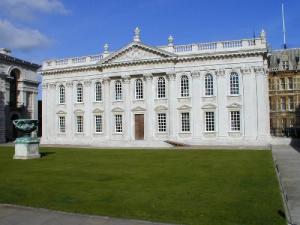In the 1700s, calculus quickly became the most powerful tool for those practicing “mixed mathematics”, a diverse field of analysis dealing with the motions created by known forces. Throughout that century, it was used by a relatively narrow class of elite mathematicians, primarily to predict celestial motions, but also to analyze problems in ordinary mechanics and hydrodynamics. Increasingly, its development was centered on France, but in the 1800s it was adopted by large new groups of British and German physicists, who used it to establish the new fields of thermodynamics and electromagnetism.
 The Cambridge Senate House today
The Cambridge Senate House today
The expansion in the population of calculus-users was made possible by new methods of mathematical training. At Cambridge University, the center of new physics developments in England, the mathematical “tripos” examination, taken in the Cambridge Senate House at the end of students’ course of studies, shifted from an oral examination to a written one in the late 1700s, and began adopting Continental mathematics in the early 1800s. Exam results were listed in an “order of merit” with the “wranglers” at the top (the “senior wrangler” being the highest rank), down through senior and junior “optimes” to the unranked “hoi polloi”. The competitiveness of these exams, and the sophistication of response that could be recorded on paper, allowed the exams to become unprecedentedly difficult over the course of the 19th century, often including cutting edge results.
To cope with the difficulty of these exams, students preparing for the tripos had to undertake continual study, not only to absorb the mathematics, but to train their abilities to use it appropriately. College lectures proved sorely inadequate for the task. Students instead turned to private tutors, or “coaches”.
The term coach came from the speedy horse-drawn coaches that could, in the decade or so prior to the widespread use of the train, transport wealthy students between London and Cambridge (about 60 miles) in
Read More…Read More…